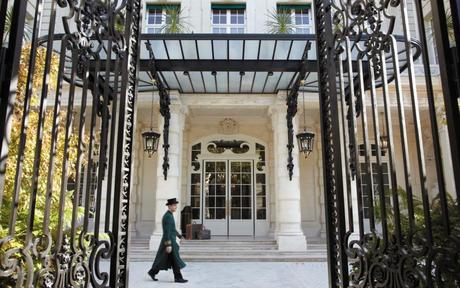
Guests were once mocked for their ridiculous demands for five-star hotels. In 2016, travel company Oliver's Travels published, rather indiscreetly, a list of client assignments to the villa specialist's concierges. They include: "arrange a gospel choir to come out of the woods singing"; "turn the room into a Batcave, complete with roaming Bat-signal on the house" and, in a request worthy of any diva, "please remove all insects in the garden before our arrival".
Some hotel brands took early advantage of the publicity potential of a crazy perk or amenity. Who can forget Namale Resort & Spa in Fiji's offer to host a romantic "picnic kidnapping" for couples; Kimpton Hotels' "free pet goldfish" in every room; or the Wild Dunes wedding resort in South Carolina, which in 2015 ventured a "witness for hire," complete, presumably, with shiny tie and potted speech.
In 2024, outlandish concierge deals are an expectation for big-spending guests. Kathleen Reidenbach is senior vice president of marketing and commercial for IHG hotels and resorts, which operates 19 hotel brands in 6,000 destinations. She says perks like concierge-scheduled romantic concerts increase customers' brand loyalty "and leave lasting impressions." Such extras also indicate value for money, in the context of the price of five-star hotel rooms rising 34 percent globally since 2019. Room rates for luxury hotels in New York have risen by as much as 82 percent.
Set over six floors of the palatial former residence of Prince Ronald Bonaparte (the great/little man's cousin), the Shangri-La Paris has rooms with Eiffel Tower views from £1,495 per night. This year, guests can enjoy an "immersive fragrance experience" with Parisian perfumer Guerlain, as well as cruises down the Seine on a "vintage Venetian speedboat."
Guests at the brand's Oman outpost, Shangri-La Al Husn (doubles from £403), can make the most of an in-room "incense sommelier", while a "baklava butler" is on hand to satisfy your sweet cravings at the Shangri -La Bosphorus in Istanbul (where doubles are a piece of cake, from £260). In the monochrome-style Wow and Ewow Suites at the W Budapest, opening in 2023 (suites around £8,000), you'll find full-service bars and a mixologist at your disposal.
The story continues
Dubai's Burj al Arab, the legendary (unofficial) 'seven star hotel', has been leading the bizarre extras game for more than a decade. For 2024, guests can make use of professional florists and a fleet of supercars, with rooms from £1,700 and including private butlers.
Dr. Charlotte Russell, a clinical psychologist and founder of thetravelpsychologist.co.uk, believes that the uniqueness of five-star hotels is due to the fact that people adapt to pleasurable experiences and that over time we no longer experience the tension of a driver or bottle of welcome champagne. It's a concept, says Russell, known as "hedonic adaptation."
"For the super-rich, this is reinforced by relationships with others in a similar financial position," she says. She adds that experiences that are strikingly new are more likely to be memorable and instill a sense of curiosity or awe, although luxury hotels walk a fine line when it comes to the risk of becoming gimmicky.
The unstoppable rise of new experiences is also due to the changing demographics of hotel customers. By 2030, millennials and Gen Z travelers will represent 80 percent of global luxury hotel consumers. These generational cohorts value "meaningful luxury experiences over owning luxury goods," according to Hospitality Net. And with a record 909 luxury hotels currently under construction worldwide, the race is on to delight younger guests with unique, social media-friendly and hyper-local consumables and experiences.
Luxury hotels in London are competing to offer crazy perks to their guests' four-legged friends. The Lanesborough offers dog owners cream teas with their furry companions, plus a butler for walks in nearby Hyde Park. The Egerton House Hotel in Knightsbridge serves 'dog-tini' cocktails; and Bankside Hotel's dog concierge service offers a range of extras for guests' pampered pooches, from pet spa bookings to a menu of edibles from organic pet food brand Lily's Kitchen.
Vic Paterson, 49, recently stayed at five-star boutique The Milestone in Kensington with her husband Greg and pet dealer Albert and was surprised by the hot breakfast options for dogs and even cats. "Albert ate sausages and scrambled eggs from a porcelain plate every morning and was greeted by the doorman as 'Mr Albert'," she laughs. "The hotel even arranged a pet sitter. To be honest, it was all quite strange, but fun."
However, most luxury hotel extras rely on destinations' reputations for food, natural landscapes or services. At Relais & Châteaux's five-star Coquillade Provence hotel in the Luberon, guests can hunt for the rare black diamond truffles with an expert from the Jaumard family and the dogs Mirette and Polka, before dining on their findings prepared by a Cordon Bleu chef with paired wines.
In the same vein, guests at the Four Seasons Nam Hai, Hoi An can order a new wardrobe from the Vietnamese city's renowned tailors, with their bodies 3D scanned in their suite and tailor-made items delivered within 24 hours. Guests at Six Senses Fiji on the idyllic island of Malolo (doubles from £900) can be coral gardeners for a day before enjoying a sunset next to their own private pool.
While five-star brands smell the sweet scent of both incense and valuable bookings, it's a trend that shows no signs of slowing down. Expect these benefits to keep getting weirder and more wonderful.
